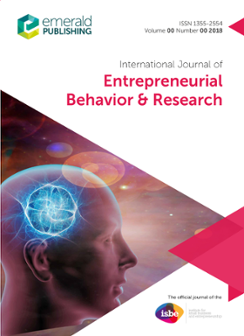数字商业模式:来自文化遗产业务的图解框架
IF 4.7
2区 管理学
Q1 BUSINESS
International Journal of Entrepreneurial Behavior & Research
Pub Date : 2022-02-18
DOI:10.1108/ijebr-01-2021-0088
引用次数: 5
摘要
本文提供了对数字化转型如何影响商业模式以及企业如何在数字经济中有效和成功地运营和竞争的全面理解。设计/方法/方法本研究采用了一种溯因法(Dubois和Gadde, 2002),在理论和经验证据之间不断移动。系统的文献回顾引导了第一个概念的发展,并在理论过程中使用了文化遗产部门的实践实例。本文通过一系列假设描绘了一个数字模型框架,这些假设是关于组织如何通过编排新的互动流程,以相互关联的方式创造和传递价值,并向客户提供体验主张,以及价值如何在经济、社会和文化成果方面形成框架。独创性/价值该研究通过讨论数字商业模式作为传统商业模式的增强而不是替代的作用,为科学辩论做出了贡献;它将数字商业模式定义为由三个主要支柱组成:价值编排、体验主张和价值共享。本文章由计算机程序翻译,如有差异,请以英文原文为准。
A digital business model: an illustrated framework from the cultural heritage business
PurposeThe paper offers a comprehensive understanding of how digital transformation affects business models and how firms operate and compete effectively and successfully in a digital economy.Design/methodology/approachThe research adopted an abductive approach (Dubois and Gadde, 2002) through constant movement between theory and empirical evidence. A systematic literature review led the first conceptual development and examples of practices from cultural heritage sectors were used in the theorizing process.FindingsThis paper depicts a digital model framework through a set of assumptions about how an organization creates and delivers value in an interconnected way by orchestrating new interactive processes, and providing experience propositions to customers, and about how value is framed in terms of economic, social and cultural outcomes.Originality/valueThe study contributes to the scientific debate by discussing the role of digital business models as enhancements more rather than replacements of traditional business models; it frames a digital business model as consisting of three main pillars: value orchestration, experience propositions and value sharing.
求助全文
通过发布文献求助,成功后即可免费获取论文全文。
去求助
来源期刊
CiteScore
10.20
自引率
16.40%
发文量
94
期刊介绍:
The International Journal of Entrepreneurial Behavior & Research (IJEBR) has a unique focus on publishing original research related to the human and social dynamics of entrepreneurship, and entrepreneurial management in small and growing organizations. The journal has an international perspective on entrepreneurship and publishes conceptual papers and empirical studies which bring together issues of interest to academic researchers and educators, policy-makers and practitioners worldwide.The editorial team encourages high-quality submissions which advance the study of human and behavioural dimensions of entrepreneurship and smaller organizations. Examples of topics which illustrate the scope of the journal are provided below. Topicality Nascent entrepreneurship and new venture creation Management development and learning in smaller businesses Enterprise and entrepreneurship education, learning and careers Entrepreneurial psychology and cognition Management and transition in smaller, growing and family-owned enterprises Corporate entrepreneurship and venturing Entrepreneurial teams, management and organizations Social, sustainable and informal entrepreneurship National and international policy, historical and cultural studies in entrepreneurship Gender, minority and ethnic entrepreneurship Innovative research methods and theoretical development in entrepreneurship Resourcing and managing innovation in entrepreneurial ventures.

 求助内容:
求助内容: 应助结果提醒方式:
应助结果提醒方式:


